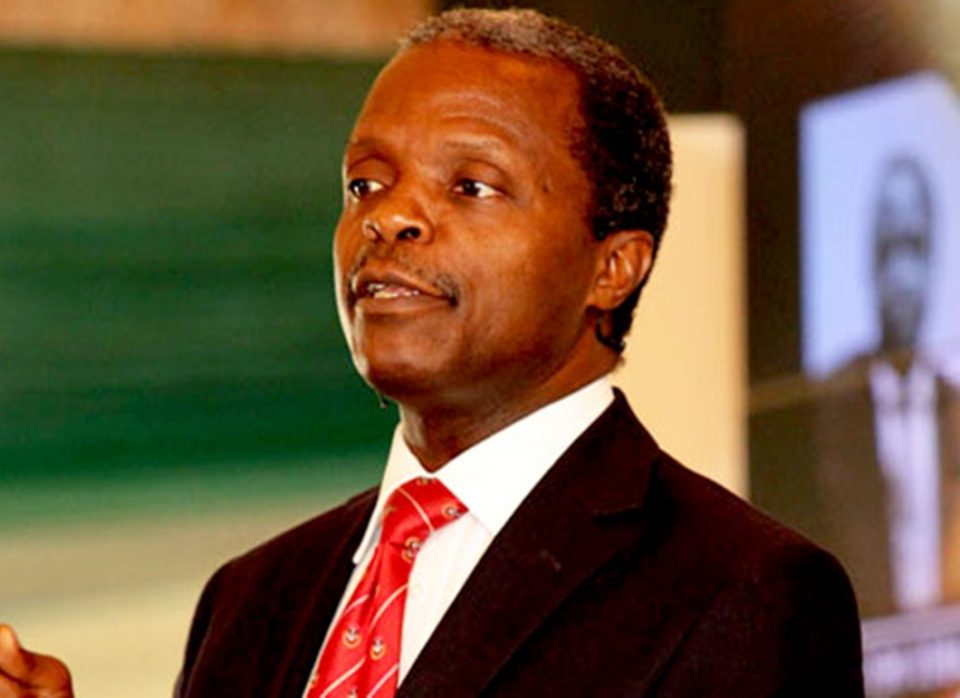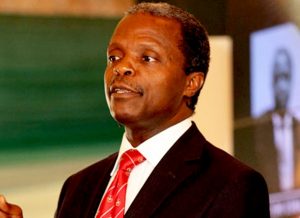
 Acting President Yemi Osinbajo has called for the prosecution of banks and their officials who aid corruption by hiding looted funds.
Acting President Yemi Osinbajo has called for the prosecution of banks and their officials who aid corruption by hiding looted funds.
He faulted those who accuse the Economic and Financial Crimes Commission (EFCC) of engaging in media trial, saying it was corruption fighting back.
The Acting President spoke in Abuja at the opening of a three-day conference on “Promoting International Cooperation in Combating Illicit Financial Flows and Enhancing Asset Recovery to Foster Sustainable Development”.
It was organised by the Presidential Advisory Committee Against Corruption (PACAC).
Other speakers were Attorney-General of the Federation (AGF) Abubakar Malami (SAN), Foreign Affairs Minister Geoffrey Onyeama, PACAC Chairman Prof Itse Sagay (SAN), a member of the High Level Panel on Illicit Financial Flows from Africa, Mr Akere Muna, who was the keynote speaker, former EFCC chairman Nuhu Ribadu, PACAC Executive Secretary Prof Bolaji Owasanoye and activist-lawyer Femi Falana (SAN), among others.
Referring to a report by the High Level Panel that was headed by former South Africa President Thabo Mbeki and commissioned by the African Union and the United Nations Economic Commission for Africa (UNECA), Osinbajo said most of the illicit funds from Africa were from Nigeria.
Anti-graft agencies, he said, should do more to curb the trend.
“That shows us very clearly, especially the security agencies, that we simply have to do more. It is evident that so much money is leaving our shores,” he said.,
Osinbajo said financial institutions that aid corruption should face the consequences.
He said: “There is no way the transfer of these assets can happen without a handshake between the countries that they are transferred from and the international banking institutions in the countries in which they are transferred. There is no way it will happen without some form of connivance. ,
“We have to look at somehow delegitimising those kinds of financial institutions and criminalising them.
“Banks and financial institutions that actually engage in this must be called out and made to face the consequences of engaging in criminal practices. If that is not done, we are not likely to go very far.
“In the agreement and conventions we will be signing, we must ensure that financial institutions are not given a free run and to hold them accountable., “
The Acting President said corruption fights back when stolen monies find safe havens and are accessed by the corrupt.
“In Nigeria, for instance, corruption fights back so eloquently that government itself, if not careful, can be overwhelmed,” he said. ,
Osinbajo said some of those guilty of corruption fight back through media attacks on government.
“If you look at the anticorruption fight in Nigeria, there is a major fight back in the media. There is a media war, between people fighting corruption and those behind the stolen funds. ,
“It is called ‘media trial’ – I don’t know what that means. If you discover, for instance, large sums of money in an air conditioned room, there is no where it will not make news in the world. ,
“So, this whole idea of trying to legitimise corruption is definitely being fuelled and sponsored by those who have these resources, who have stolen funds.
“Unless we see it as a problem that can bring down our system then we will never be able to fight. I hope we will be able to advance this with other African countries,” he said.,
The Acting President said some development partners were reluctant to provide funding for Nigeria because they believed the country was not poor.
“Clearly it is sometimes absurd that when we are asking for aid, so much money is being stolen. So we ourselves must take responsibility and ensure we keep talking about this,” he said.
Osinbajo said developing countries must realise that it is their responsibility to ensure that not only are stolen funds traced and returned, but calls for return of stolen assets must be strident.
“Some countries are somehow reluctant about it. Many have civil processes that make it difficult. They said: ‘Our courts are handling this matter and there is very little we can do about it.’ ,
“We must make it a national call, a call for other developing countries to have the same outrage for drugs, terrorism financing as for illicit financial flows.
“We must emphasise at every point and call out institutions that are not cooperating and ensuring that they recognise that this for us is a serious issue,” he said.
According to Muna, Africa loses between $50billion and $80billion through illicit financial flows; the continent remains a net creditor despite the inflow of development assistance.
He said secrecy in financial transactions, which he noted had been hijacked by greed and self-interest, must end.
“It is imperative that we make it a priority to double efforts to end the use of financial secrecy for corruption, drug smuggling, money laundering, terrorism, people trafficking and other illicit financial practices,” he said.
Muna reiterated a recommendation by the Mbeki Panel – that escrow accounts should be created within development banks to keep recovered stolen assets, pending when they are returned to the owners.
“Frozen money should not stay with the complicit bank, but in an escrow account with a third party pending the courts’ or competent authorities’ determination as to the rightful owners of the funds,” he said.
Source: The Nation
